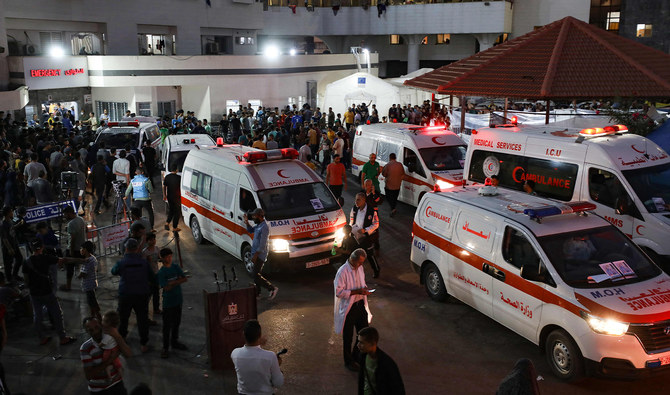GAZA: An Israeli air strike on Tuesday killed about 500 Palestinians at a Gaza City hospital crammed with patients and displaced people, health authorities in the besieged enclave said.
The strike was the bloodiest single incident in Gaza since Israel launched an unrelenting bombing campaign against the densely populated territory in retaliation for a deadly cross-border Hamas assault on southern Israeli communities on Oct. 7.
It took place on the eve of a visit by US President Joe Biden to Israel to show support for the country in its war with Hamas, which rules the Gaza Strip.
Arab countries, Iran and Turkiye swiftly condemned the attack. The Palestinian prime minister called it “a horrific crime, genocide” and said countries backing Israel also bore responsibility.
Sources at the Gaza Ministry of Health told Reuters that around 500 Palestinians were killed in the air strike on Al-Ahli Al-Arabi hospital.
Hamas said the bombing mostly killed people left homeless by Israel bombardments, and that the dead included patients, women and children.
“There are scores of dismembered and crushed bodies, baths of blood,” said Izzat El-Reshiq, a senior Hamas member.
Video obtained by Reuters showed several full ambulances arriving at another Gaza hospital carrying people injured at Al-Ahli Al-Arabi hospital. One man was staggering, bleeding heavily from the head. A boy was being carried on a stretcher.
The Israeli military said it did not have any details about the reported bombing, but was checking. It has previously accused Hamas of using Palestinian civilians as human shields.
In Washington, the Pentagon said it was aware of the reports about the hospital being hit but had no details. The Pentagon, which has sent five C-17 aircraft with military assistance to Israel so far, reiterated that there were no preconditions on the aid being provided and added: “We expect all democracies like Israel to uphold the law of war.”
Earlier on Tuesday, the United Nations Palestinian refugee agency UNRWA said an Israeli air strike had killed at least six people at one of its schools that has been functioning as a shelter for displaced people.
“This is outrageous and again it shows a flagrant disregard for the lives of civilians,” UNRWA said in a social media post. “No place is safe in Gaza anymore, not even UN facilities.”
Health authorities in Gaza say at least 3,000 people have been killed in Israel’s 11-day bombardment since Hamas militants rampaged into Israeli towns and kibbutzes on Oct. 7, killing more than 1,300 people, mainly civilians.
Israel has flattened parts of heavily urbanized Gaza with air strikes, driven around half of its 2.3 million population from their homes and imposed a total blockade on the enclave, halting food, fuel and medical supplies.
Amid the death and destruction, the humanitarian crisis in the enclave worsened as Israeli troops and tanks massed on the border for an expected ground invasion.
Scores of trucks carrying vital supplies for Gaza headed toward the Rafah crossing in Egypt on Tuesday, the only access point to the coastal enclave outside Israeli control, but there was no clear indication that they would be able to enter.

























